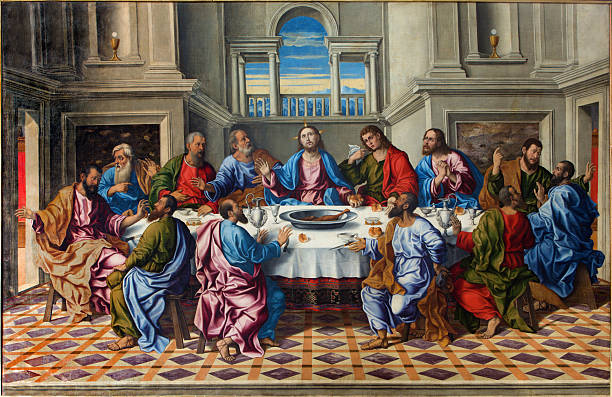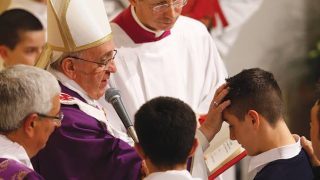
MAUNDY THURDAY
HOMILY FOR HOLY THURSDAY MASS OF THE LORD’S SUPPER. Readings: Exodus 12:1-8.11-14; Psalm 116; 1 Corinthians 11:23-26 and John 13:1-15.
Tonight, we begin the Paschal Triduum of the Holy Week, which will come to an end with the Easter Vigil. In a subtle manner, it is a mass that last for three days as the dismissal of today’s celebration won’t be in the usual terms “Go forth the mass is ended…” till the Vigil Mass of Holy Saturday. Hence, we are urged to fully participate in this present and yet historical celebration which begins with the Maundy Thursday.
The ‘Maundy’ Thursday is from the Latin word mandatum which means ‘command.’ It is also similar to the Portuguese word mandamento, meaning ‘commandment.’ The maundy Thursday constitutes the commandment of love, the washing of the feet of the Apostles and the Last Supper. In this celebration Christ instituted the Holy Eucharist and the Priesthood. Still in this celebration, we have the stripping of the Altar and vigil prayer to keep watch with Christ in the garden.
It is called maundy Thursday because it is the day Christ gave the new commandment of Love, to love one another as he has loved us (Jn 13:34). This commandment came at the last days of Christ’ life on earth, and we can attest to the importance of the last words of someone who is about to die. This commandment gives the summary of all his teachings. As effective love is rooted in service and sacrifice (S2). This is evident as he prepares to wash the feet of his disciples and lay down his life for us all.
Through the service of washing of feet, Christ strikes a balance between his prayer life and apostolic work. Put differently, he expressed the maxims: Carthusians indoor and apostles outdoor. Invariably, as Christians, we must strike balance between our prayer life and apostolic life. Our actions should reflect love and prayer without using words. Our prayer life and actions should be like the two functioning lungs, legs, hands, eyes of the human body. If one is malfunctioning, the person becomes less effective. Of cause, there can’t be a balance and so, when there is no balance of our prayer life with and our works of service/love, we become less effective or limping Christians.
We must give ourselves like the burning candle in service and sacrifice to others. We do this, not only for those we love but inclusive of our enemies. If we love as he has loved us, how many of us can wash the feet of our enemies or subordinates? How many can render selfless service to the person that have betrayed or denied us, or those that keep stabbing us behind back like Judas and Peter? The love Christ expressed is unconditional. It is on this note Christ offered himself as the living sacrifice and asked us to do the same by washing one another’s feet. So, each time we profess our love, let us ask ourselves if we are ready to make sacrifice and to wash the feet of others? There can’t be love without sacrifice.
The bloody sacrifice of Christ is what we celebrate in an unbloody manner in the Eucharist. This was the night he instituted the Eucharist, when he said to his disciples as we have in the second reading, “On the night when he was betrayed took bread, and when he had given thanks, he broke it and said, ‘This is my body which is for you. Do this in remembrance of me…’” (1 Cor 11:24-26). Traditionally, the Bishop celebrates the institution of the Eucharist and the priesthood in the morning of maundy Thursday known as Chrism mass. For pastoral reasons, it can be celebrated in a day closer to this day. In this celebration, the priest renews their priestly promises before the Bishop. Having done this, the priest returns to his parish to celebrate the sacrifice of the Holy mass with the people of God in memorial of Christ.
Interestingly, with the chalice, he made a new covenant with his blood at the ‘hour’ of glorification, recalling at the wedding feast at Canaan, he said to his Mother, “Woman, my ‘hour’ has not yet come” (Jn 2:4). However, he turned the water into wine and when the hour of glorification came, he turned the wine into his blood from which he established a new covenant. The law of the Passover as we have it in the first reading expressed the old covenant God made with the Israelites through his servant Moses to sprinkle blood of animals on the doorpost on the memorial of the Lord’s Passover, “The blood shall be a sign for you, upon the houses where you are; and when I see the blood, I will pass over you, and no plague shall fall upon you to destroy you, when I strike the land of Egypt. This day shall be for you a Memorial Day and you shall keep it as the feast of the Lord; through out your generation, you shall observe it as an ordinance forever” (Ex 12:11-14). This covenant is made new and continues in an unbloody manner in the Eucharist through a validly ordained priest.
The priesthood and the Holy Eucharist are in a practical sense interwoven. There can’t be Eucharist without the ministerial priest and similarly there can’t be a priest without Eucharist. Hence, in accordance with Vatican II document, the Eucharist remains the source and submit of our Christian faith. Who presides over the Eucharist is the priest. So, today’s liturgy invites us to celebrate our priests. How many of us call or send messages to congratulate our priests or the priests we know on this great day? Or are we only good in destructive criticism and condemnation of our priests? Even when we realized their weaknesses, do we create time to pray for them or we bring them to the table of discussion and tear them apart? Priests are also encouraged to remain men of prayers, for when we cut off from prayers, we can do nothing.
While we celebrate the Holy Eucharist and the Ministerial Priests today, let us be reminded that we all share in the common priesthood of Christ and so must live in accordance with his mandate celebrate the Eucharist in memorial of him, which should also reflect in our love for one another.
Happy Maundy Thursday and to all Priest, Happy Feast Day.
Fr. Ken Dogbo, OSJ










